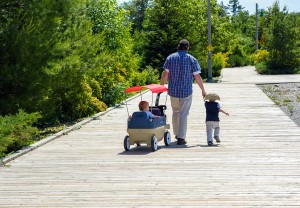 Are you documenting this Labor Day with lots of pictures? (My kids are certainly smiling–only 3 days of school and already a holiday!) Say cheese along with your friends and family and boost your own happiness in the process.
Are you documenting this Labor Day with lots of pictures? (My kids are certainly smiling–only 3 days of school and already a holiday!) Say cheese along with your friends and family and boost your own happiness in the process.
Here’s an amazing fact: facial expressions and body postures alone can actually make us feel. Facial expressions alone, without first feeling the corresponding emotions, are enough to create the discernible changes in your nervous system. Tighten your jaw and narrow your eyes as if you are really angry. Your body will usually release adrenaline and your heart rate will speed up as if you are actually angry. The same thing is true for positive emotions. This means that sometimes we should just smile, even if we don’t feel like it.
Take Action: Move your facial muscles so that you are technically smiling. When you lift up your lips and crinkle your eyes, your body will release all kinds of feel-good brain chemicals into your system after a couple of minutes. You can hold a pencil between your teeth or mimic the act and you will likely slow your heart rate and start to feel calmer, happier. Warning: I’ve found that the pencil clenching trick works, but it makes me drool.
Join the Discussion: Do you feel a little happier? Share in the comments.



 I’m not surprised that research shows that greater health and happiness can come from caring for a pet. One study tracked “hypertensive stockbrokers” who adopted a cat or dog; caring for their new animals lowered their blood pressure more than prescribed medicine! And you may have heard about the study that found that dog-owners tend to get more exercise than folks without a dog. Exercise is, of course, a sure way to boost health and happiness.
I’m not surprised that research shows that greater health and happiness can come from caring for a pet. One study tracked “hypertensive stockbrokers” who adopted a cat or dog; caring for their new animals lowered their blood pressure more than prescribed medicine! And you may have heard about the study that found that dog-owners tend to get more exercise than folks without a dog. Exercise is, of course, a sure way to boost health and happiness. Technology can be addictive, and it can change the core of who we are as people. Researchers believe that when we are over-connected to technology (including our email, the Internet, and our cell phones) we can become more impatient, impulsive, forgetful — and even more self-centered. These qualities do not make us happier people or better parents.
Technology can be addictive, and it can change the core of who we are as people. Researchers believe that when we are over-connected to technology (including our email, the Internet, and our cell phones) we can become more impatient, impulsive, forgetful — and even more self-centered. These qualities do not make us happier people or better parents. Last weekend I was at a fundraiser where several musicians were playing live. I was close enough to the guitar player, Jack, to be able to watch his expressions while I listened to him play. As I watched, I noticed myself grinning right along with Jack. He was totally in the moment, happiness flowing through him and his instrument, sheer bliss radiating from his face.
Last weekend I was at a fundraiser where several musicians were playing live. I was close enough to the guitar player, Jack, to be able to watch his expressions while I listened to him play. As I watched, I noticed myself grinning right along with Jack. He was totally in the moment, happiness flowing through him and his instrument, sheer bliss radiating from his face. pediatrician to talk to me about it, and she even created a code word for us that meant, “for god’s sake, improve your posture!” so she could remind me in public, theoretically to avoid embarrassment.
pediatrician to talk to me about it, and she even created a code word for us that meant, “for god’s sake, improve your posture!” so she could remind me in public, theoretically to avoid embarrassment.


